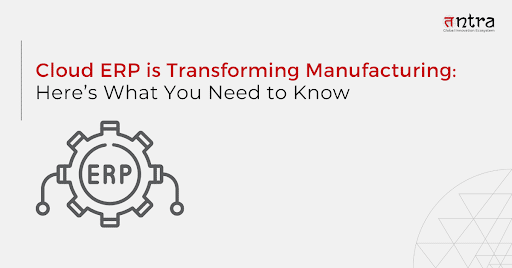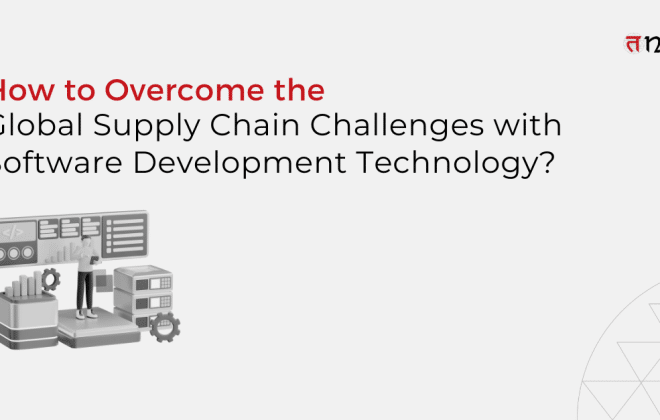
Cloud ERP is Transforming Manufacturing: Here’s What You Need to Know
Table of Contents
ToggleThe manufacturing industry heavily relies on ERP, with 47% seeking new solutions. Cloud-based ERP solutions are gaining traction due to their scalability, cost-effectiveness, and improved management across production, inventory, and data. Cloud ERP streamlines production, unifies data for better decision-making, enhances security, and allows easier scaling and updates. This empowers manufacturers to thrive in a competitive environment. This blog addresses how cloud ERP applications are transforming the manufacturing business by streamlining their entire supply chains. Read now!
The 123-year-old British candy manufacturer Cadbury is owned by Mondelez
International, a massive American snack food conglomerate. Even with its quick rise to prominence, the business had trouble meeting its demand for manufacturing and delivery. SAP ERP application was brought in to completely restructure the supply chain, including the distribution and warehousing processes, to address these problems it faced.
The management of Cadbury and the vendors had to work closely together and make frequent changes throughout the planning stage of the ERP adoption. Even though it took a while, the ERP transforms the firm with a thorough real-time perspective of the main operations.
Cadbury experienced major benefits from the cloud ERP software, such as enhanced warehouse management, higher productivity, and quick growth. The process was made more efficient, and there were fewer problems throughout the deployment phase thanks to the best vendors and their adaptive decision-making abilities. The business was also able to save money because of the vendor’s efficiency. Selecting the appropriate partner, such as Zillancer, can result in an ERP solution that is easier to use and more efficient.
Implementing cloud ERP manufacturing systems is a testament to how Cadbury streamlined its operations. Manufacturing companies like Cadbury can benefit by streamlining their processes and building a connected supply chain. The result is overall efficiency in the manufacturing and production process.
(Source: Change Management Insight)
The Rapid Growth of ERP in Manufacturing
Manufacturing industries are the number one users of ERP compared to any other segment. With a 33.66% market share, the world of manufacturing relies heavily on ERP software. It entails the importance of ERP software in streamlining the supply chain and ensuring efficient operations.
47% of manufacturing companies are looking to purchase ERP solutions for their business. The increasing demand comes from the benefits that digitization of the supply chain offers. It enables better management of inventory and logistics management. The demand is expected to increase with every passing year.
44% of all implementations in the manufacturing and distribution sectors, according to survey respondents, involve cloud deployments. Cloud ERP solutions are increasingly gaining traction as companies want to reduce their dependence on limited architecture. Cloud ERP software provides complete freedom to access resources from anywhere the users want.
How cloud ERP is Transforming Manufacturing
Over the past ten years, cloud computing has grown at an accelerated rate, and in the last few years, there has been a push for more connected organizations. For companies of all sizes, cloud ERP offers a number of advantages. Manufacturing is rapidly evolving into a highly connected, intelligent, and productive sector as more companies go to cloud ERP.
Here’s how cloud ERP is All Set to Transform the Manufacturing Space:
- Aligning production goals
Production planning is made easier with cloud-based ERP systems, which is one of its main benefits for manufacturing companies. Manufacturers may examine their production capacity, inventory levels, and schedules in real time by utilizing a cloud ERP system. This enables them to decide on resource allocation, modify production schedules to suit demand, and streamline production procedures with knowledge. This lowers product lead times, improves customer satisfaction, and results in a more effective and efficient manufacturing process. - Data unification
Real-time visibility into the company’s operations and performance is made possible via cloud-based ERP solutions. Making better business decisions quickly is made easier when companies have a comprehensive understanding. Other departments benefit from opportunities presented by unified data. Companies are able to monitor a customer’s journey across several touchpoints inside the brand, for example. Accuracy and speed in financial reporting are anticipated to increase. Through the integration of unified data with potent tools like Microsoft Power BI, companies may extract insightful information about various aspects. - Better security
Businesses that switch to a cloud-based ERP give up control over their security to the service provider. Modern ERP system suppliers are almost all outfitted with enterprise-level security measures that are state-of-the-art. Their capacity to protect data and information has grown to be a key selling advantage in the fiercely competitive market, and it is also a requirement for companies. Cloud ERP manufacturing platforms can provide a range of cybersecurity features to enhance the protection of the manufacturing company, in addition to providing an impenetrable barrier around the virtual site where businesses carry out their operations. - Scalability and adaptability
Compared to an on-premises ERP system, a cloud ERP solution may assist the manufacturing company in scaling considerably more swiftly and easily. This is so that a cloud ERP solution can be used without requiring investments in hardware and infrastructure. It’s also simpler to incorporate new functionality when needed. Manufacturers can simply handle system updates and new features across the organization using Microsoft Dynamics 365, for instance, and have the freedom to deploy how and where they want. Manufacturers can also swiftly add new capabilities by leveraging extensions. - Cutting down costs
A technician must often visit the location to manually update the apps in on-premise settings. When an update alert from the vendor is received, the company can quickly update manufacturing-specific cloud-based ERP systems. It’s also important to remember that the majority of customized ERP solutions on the cloud are available as recurring subscriptions. Thus, businesses can adjust strategies to meet evolving demands based on their needs. These strategies also increase the scalability of cloud ERP software, which is crucial in a sector that experiences fluctuations like manufacturing.
Cloud ERP Helps Manufacturing Companies Thrive
Manufacturing companies are changing as a result of cloud ERP, which gives them access to more flexible, cost-effective, and efficient operational management tools. Software product engineering services and cloud ERP assist manufacturing enterprises in achieving objectives by increasing efficiency, lowering costs, and improving customer satisfaction. It does this by providing scalable and flexible solutions, enhanced inventory management, better supply chain exposure, elevated data security, and streamlined production planning. It’s evident that cloud ERP will grow more and more crucial for manufacturing companies, and those who use it will have an advantage over their competitors in the years to come.
If you are looking for a trusted software product engineering company to implement cloud ERP systems and elevate your manufacturing capabilities, Tntra technology solutions is the right choice for you. With our 13+ years of experience and an upper hand in technology, Tntra management consulting is well-equipped to streamline your operations through cloud ERP.
Book a FREE CONSULTATION CALL today!




